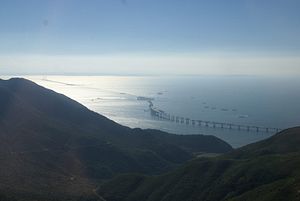Hong Kong’s Independent Commission Against Corruption (ICAC) has arrested 21 employees of a government contractor responsible for compression testing concrete samples from the Hong Kong-Zhuhai-Macau bridge, South China Morning Post reports.
The operation, codenamed “Greenfield,” was launched Tuesday May 16. Two senior executives and 19 laboratory site technicians and assistants were arrested for alleged corruption relating to false concrete compression test reports.
In a press release from the ICAC, it was revealed that some of the tests were not conducted within the set time frame as required in the contract. It is suspected that the site laboratory technicians and laboratory assistants may have falsified the reports in an effort to meet delivery deadlines. The ICAC believes the indiscretions could have started as early as 2015.
The initial concern was raised by the Civil Engineering and Development Department, the responsible government office which has been working with the contractor since January 2013. Irregularities were initially detected in concrete compression test reports, prompting the contractor to perform its own internal investigation. However, executives at the undisclosed contractor allegedly concealed key information in this internal investigation, including the use of metal calibration cylinders and high-strength concrete cubes to falsify the initial tests.
In a follow-up release, the ICAC issued an unusual statement to indemnify any government officials of wrong doing.
“According to ICAC investigation, the malpractice mentioned in the press release concerned only the contractor of the Civil Engineering and Development Department (CEDD) and its staff members,” the statement read. “There is no information or evidence to suggest that any public officers, contractors or material suppliers (or their personnel), other than the CEDD contractor and its staff members, were involved in the above malpractice.”
The Hong Kong-Zhuhai-Macau bridge project consists of a series of cross-channel bridges and tunnels, as well as a 150 hectare artificial island, that will connect Hong Kong, Macau, and Zhuhai in Guangdong province. Begun in December 2009, the project was set to be completed by 2016 at a cost of approximately US$10.6 billion. In April 2016, the Hong Kong Highways Department applied to extend of the usage of a site linked to the Hong Kong-Zhuhai-Macau bridge project to 2020.
The project is especially significant to Beijing as it will connect the Special Economic Zone of Zhuhai with the Special Administrative Regions of southern China: Hong Kong and Macau.* It is the first major combined bridge and tunnel sea crossing in China, and was jointly launched by the chief executive of Hong Kong at the time, Donald Tsang, and the then-Governor of Guangdong Province, Huang Huahua.
The project has courted a number of controversies, least of which is the shifting deadline. It is estimated that project costs have blown out to double the original budget, but worryingly, the Hong Kong representative of the project was unable to give the Hong Kong legislature an exact figure to the overrun earlier this year.
The Hong Kong administration was criticized by legislators for trying to conceal the number of fatalities during the construction of the bridge earlier this year. The Labor Department submitted a report to the Hong Kong legislature stating that there had been five deaths and 234 injuries between 2011 and 2016. However legislative members questioned how these numbers were calculated, as it was revealed that in fact nine people had died on the Hong Kong portion of the project alone.
The department said it had conducted more than 1,380 inspections, made 329 prosecutions, and issued over 280 suspension or improvement notices since construction commenced in 2011. Lawmakers have previously criticized the use of suspensions, as the stoppages only added pressure to delivery timelines, with the risk of sacrificing work safety and quality.
*A previous version of this article referred to Hong Kong and Macau as Special Economic Zones rather than Special Administrative Regions.
































